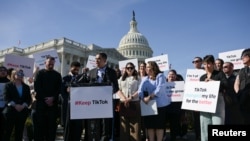The bill, passed by a vote of 352-65, now goes to the Senate, where its prospects are unclear.
TikTok, which has more than 150 million American users, is a wholly owned subsidiary of Chinese technology firm ByteDance Ltd.
The lawmakers contend that ByteDance is beholden to the Chinese government, which could demand access to the data of TikTok’s consumers in the U.S. any time it wants. The concern stems from a set of Chinese national security laws that compel organizations to assist with intelligence gathering.
“We have given TikTok a clear choice,” said Rep. Cathy McMorris Rodgers, a Republican, from Washington State in the Pacific Northwest region. “Separate from your parent company ByteDance, which is beholden to the CCP (the Chinese Communist Party), and remain operational in the United States, or side with the CCP and face the consequences. The choice is TikTok's.”
House passage of the bill is only the first step. The Senate would also need to pass the measure for it to become law, and lawmakers in that chamber indicated it would undergo a thorough review. Senate Majority Leader Chuck Schumer, a Democrat from New York, said he'll have to consult with relevant committee chairs to determine the bill's path.
President Joe Biden has said if Congress passes the measure, he will sign it.
The House vote is poised to open a new front in the long-running feud between lawmakers and the tech industry. Members of Congress have long been critical of tech platforms and their expansive influence, often clashing with executives over industry practices. But by targeting TikTok, lawmakers are singling out a platform popular with millions of people, many of whom are younger adults, just months before an election.
Opposition to the bill was also bipartisan. Some Republicans said the U.S. should warn consumers if there are data privacy and propaganda concerns, while some Democrats voiced concerns about the impact a ban would have on its millions of users in the U.S., many of whom are entrepreneurs and business owners.
Ahead of the House vote, a top national security official in the Biden administration held a closed-door briefing Tuesday with lawmakers to discuss TikTok and its national security implications. Lawmakers are balancing those security concerns against a desire not to limit free speech online.
“What we've tried to do here is be very thoughtful and deliberate about the need to force a divestiture of TikTok without granting any authority to the executive branch to regulate content or go after any American company,” said Rep. Mike Gallagher, the bill's author, as he emerged from the briefing.
TikTok has long denied that it could be used as a tool of the Chinese government. The company has said it has never shared U.S. user data with Chinese authorities and won’t do so if it is asked. To date, the U.S. government also has not provided any evidence that shows TikTok shared such information with Chinese authorities. The platform has about 170 million users in the U.S.
Lawmakers in both parties are anxious to confront China on a range of issues. The House formed a special committee to focus on China-related issues. And Schumer directed committee chairs to begin working with Republicans on a bipartisan China competition bill.
Senators are expressing an openness to the bill but suggested they don’t want to rush ahead.
“It is not for me a redeeming quality that you’re moving very fast in technology because the history shows you make a lot of mistakes,” said Sen. Ron Wyden, a Democratic lawmaker from the U.S. state of Oregon in the Pacific Northwest region.
In pushing ahead with the legislation, House Republicans are also creating rare daylight between themselves and former President Donald Trump as he seeks another term in the White House.
Trump has voiced opposition to the effort. He said Monday that he still believes TikTok poses a national security risk but is opposed to banning the popular app because doing so could help its rival, Facebook, which he continues to lambast over his 2020 election loss.
As president, Trump attempted to ban TikTok through an executive order that called “the spread in the United States of mobile applications developed and owned by companies in the People’s Republic of China” a threat to “the national security, foreign policy and economy of the United States.” The courts, however, blocked the action after TikTok sued, arguing such actions would violate free speech and due process rights.
China bans its citizens from using many Western-owned social media apps, including Facebook, Instagram and X (formerly Twitter). Many governments around the world, including the United Kingdom and the European Union, as well as the U.S. government, ban TikTok on government-owned phones.








Forum